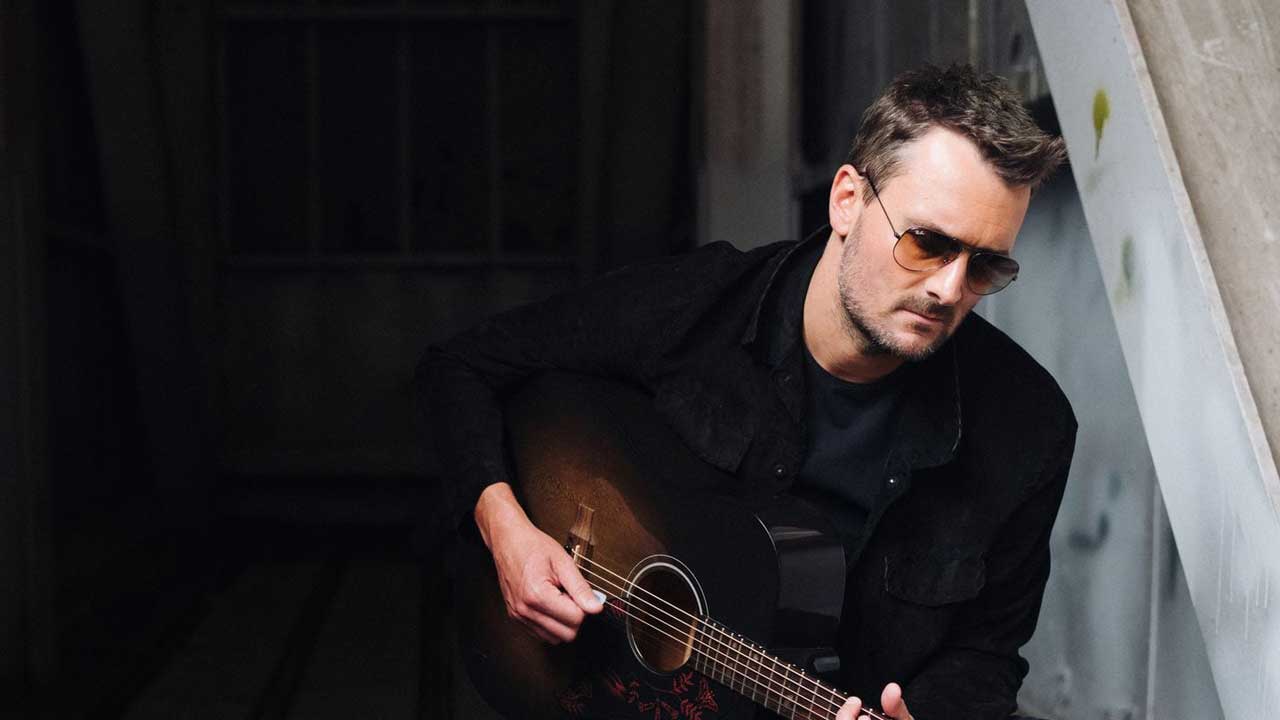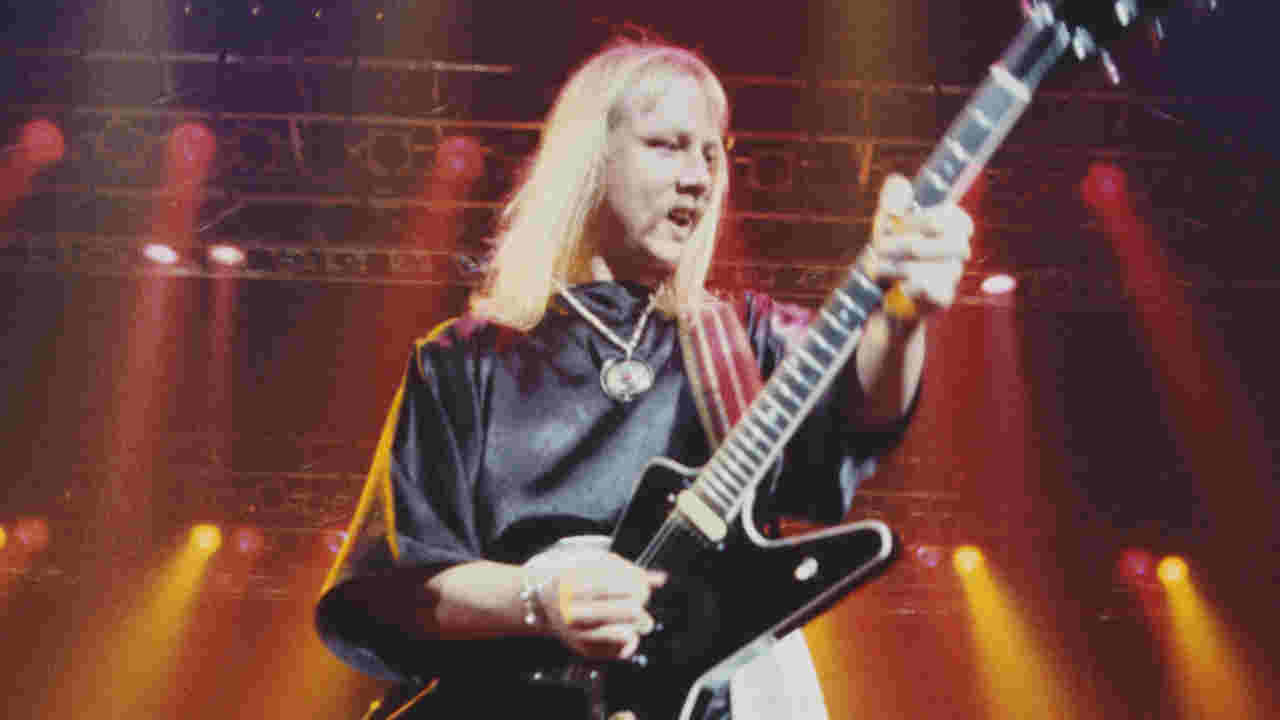Eric Church interview: alpha males and soccer moms, NASCAR and AC/DC
Eric Church, country-rock superstar, returns with a triple album, optimism for future gigs, and thoughts on *that* controversial interview

George Harrison did it. Frank Zappa and Prince both did it. Now, with his latest release Heart & Soul, Eric Church has joined the short list of artists who’ve let it all hang out creatively with a triple album.
“I certainly did not set out to do a triple album,” Church tells Classic Rock with a laugh. “We went in to make just one album. We just didn’t think we’d be as successful as we were with this kind of creative boot-camp idea I’d set up.”
Church’s boot-camp challenge was deceptively simple: wake up each day, write a song, record it. Repeat for thirty days. Pick the best songs and release them as an album.
“After the last album and tour, it was time to make another record and it felt a bit grind-y,” Church says. “We felt a little fat and happy. The thing that has made us good is that edge and sense of urgency. That sense of: ‘We’ve got to prove these motherfuckers wrong again.’ So I tried to make it harder, take us out of our element. First, we’re recording in a restaurant that’s not really a studio. No one’s ever made a record there. We have to figure out how to wire the place. We have to bring in a generator.
"All the players and songwriters are there, it’s snowing like hell and it’s ten degrees outside. And on top of that we have no material written! This cannot be any more difficult. What’s crazy is that it all fell together once we started. It made us really focus. I think creativity works best when it’s comfortably uncomfortable.”
The songs on the record are grouped together by theme: Heart songs, Soul songs and Ampersand songs for those that don’t fit neatly in either of the other two categories. From the Mellencamp-ish heartland romp of Heart On Fire, through the swampy Memphis groove of Bad Mother Trucker, to the lighters-aloft celebration of live music Through My Ray-Bans, the album is an embarrassment of riches and a master class on how to write a country song.
In a market driven by three-minute radio singles, a triple album might be an indulgent, risky move. But Church has made a career out of pushing envelopes. Born in Granite Falls, North Carolina in 1977, he grew up around gospel music in church. But what really turned his head were the power chords at his first big concert.
Sign up below to get the latest from Classic Rock, plus exclusive special offers, direct to your inbox!
“I was fourteen, and I went with the older brother of a friend to see AC/DC,” he recalls. “I was sitting on the lawn at this amphitheater, watching this huge crowd with their fists in the air as the band played Back In Black. It was my first real physical and emotional touch to rock’n’roll and to the freedom that it provided. I remember the visceral reaction to that. It really defined my youth. Everything changed in that moment. I looked around and thought: ‘Holy cow, this is cool!’”
Soon after, Church was teaching himself guitar and writing his first songs. “They were terrible songs,” he admits, “but I had melodies and sketches of little choruses. By the time I graduated high school I started to be really drawn to songwriting. That led me to Kris Kristofferson, Jerry Jeff Walker, John Prine – the people who were the quintessential songwriters. I started to study them. In college my experience had less to do with academics and more to do with songwriters.”
“When I was fourteen I went to see AC/DC. It was my first real physical and emotional touch to rock’n’roll”
Eric Church
Church earned a marketing degree. But rather than enter the job market, he headed to Nashville. Like all hopefuls, he quickly got used to rejection.
“I remember I saw this one publisher three or four times,” he says, “and they paid for a demo, then said: ‘Hey, we want you to come play for the head of the company.’ So I sit down and played Lightning, a song that ended up on my first album. I got a verse into it and this guy held up his hand. I thought he was going to go: ‘We’re signing you right now!’ But he said: ‘I don’t know where you’re from, but if I were you I’d go back there.’ I packed my shit up and left the office with my tail between my legs.
"The next day, I had another meeting, at Sony Tree Publishing, and I played Lightning. Same deal, the guy put his hand up and stopped me. I thought: ‘Jeez, I’ve got to stop playing this song’ [laughs]. He goes: ‘I’m signing you right now, just on that song.’ That was the beginning.”
When Church steps on stage now, he keeps a list in his pocket of all those who turned him down.
“There’s a motivation in being told no, that you can’t do something,” he says. “It’s part of paying your dues. My big beef with the younger generation now is that they go on shows like American Idol or The Voice and it becomes more about a onetime moment. That’s a really different thing than how you’re supposed to approach playing music. It’s okay to go to ten places and get the door slammed in your face. It’s an integral part of learning who you are as an artist. And remember: Nashville told Randy Travis to put a hat on, they told George Strait to take a hat off,” he adds, laughing.
“When I started, country had kind of a soccer-mom audience. I was something of an aggressive alpha male, in a format that was not the demographic at the time. I had radio say: ‘Nope, this’ll never work’ to my first four singles. You keep hearing that, but you keep crawling forward. You’re still moving down the trail. Then you start to learn more who you are and build your audience. It’s about evolving.”
“When I started, country had kind of a soccer-mom audience. I was something of an aggressive alpha male, in a format that was not the demographic at the time. I had radio say: ‘Nope, this’ll never work’ to my first four singles. You keep hearing that, but you keep crawling forward. You’re still moving down the trail. Then you start to learn more who you are and build your audience. It’s about evolving.”
Church’s evolution from his debut album in 2006 has been from that alpha male into a megastar with Top 10 hits like Springsteen and Drink In My Hand, platinum albums and sold-out arena shows. In 2019 he set the all-time attendance record for a concert in Nashville, playing to 56,521 at Nissan Stadium. In 2020 he won the Country Music Association’s coveted CMA Entertainer Of The Year Award.
“Awards are trophies, that’s all they are,” Church says. “Now I would be crazy to say that it didn’t matter, with all the work that we’ve done. But it’s not as much for me. I’ve had the same band and the same crew this whole time since bars and clubs. Those people are out there pushing carts and tuning guitars. I love for them to be able to work for the ‘entertainer of the year’, to be part of the biggest tour in country music. It gives validation to all the guys and girls who’ve worked so, so hard to get us to where we are. Was I gonna change whether I got the trophy or not? No. Was it gonna change me? No.”
Of the team that has stuck with Church since the beginning, no one is as integral as his producer Jay Joyce. A fine guitarist who’s produced such artists as The Wallflowers, Patty Griffin and the Zac Brown Band, Joyce is like a brother to him.
“We can communicate without communicating,” Church says. “That’s a rare thing. It’s a look, a nod. I can go: ‘It’s just not, you know… there’s that thing….’ And he goes: “Yep, I got it” [laughs]. He can do the same to me. We’ve done it forever. That was part of the reason I loved this new project. I think Jay and I were both thinking maybe we had come to the end of our relationship.
"We made six great albums together. Now maybe we need new blood. So we tried to find another way to get that juice that we had early on. It was just a matter of changing the circumstances. And we ended up with what might be our favourite project."
In the run-up to the release of Heart & Soul, it’s worth noting that Church hasn’t done any press since the fallout from a Rolling Stone interview he did in 2018. After he made some pointed but sensible comments about the National Rifle Association and the need for more gun control in America, some fans turned on him. It was one of those social-media backlashes that dog many free-thinking artists these days, especially in the conservative world of country.
“Maybe it’s a Dixie Chicks hangover [that band’s criticism of then-president George W Bush over invading Iraq led to a backlash from the country community],” Church says, “where something like that happens and you see how vehemently the fans and radio turns. It hasn’t been common in country music for artists to talk about sensitive issues. At least not since the commercial era, from Garth [Brooks]forward. If you go back in the day, you have Johnny Cash, Loretta Lynn and Merle Haggard, and, Jesus Christ, all they did was talk about controversial issues! [laughs].
"I grew up in North Carolina, where NASCAR racing is a really big thing. Dale Earnhardt was a major deal. I watched the same thing happen there [Earnhardt spoke out against the Confederate flag at NASCAR events]. All of a sudden, corporations and big success get involved, and it all gets watered down to a point where people really don’t take a stand on anything.
"They just want to continue because there’s corporate sponsorship, so they toe the line and move forward. I think in country we’ve had bit of that, and it has made us a little more fearful of speaking our minds or singing songs about those subject matters. Radio holds a big hammer in our world.
“But I think the situation is improving, and there’s diversity. If you look back at music history, the best damn music has come from diversity. I would hope that artists feel comfortable speaking or singing about whatever they want to without repercussion. I think that can become more difficult, depending on who you are. If you’re a new artist, maybe you can’t speak out as easily."
But that ruffle was nothing compared to the more serious personal issues Church faced over the past few years, including a near-death experience in 2018 with a blood clot and ER visit.
“My forties have not been my favourite time,” says Church. “I had that health scare happen, and soon as I got back on my feet we had the Vegas shooting and I was there [Church was on the bill at the Route 91 Harvest festival where 60 people were killed and hundreds more injured by a sniper]. Then right after that my brother passed away. Since I turned forty it’s kind of sucked. And then COVID happened, so we’re keeping the streak going. All that made me re-evaluate what kind of songwriter and artist I wanted to be going forward.
"I've always been committed to the song. I view myself as a songwriter before anything else. Before all that happened it might’ve bothered me if I loved a song and it didn’t go top ten. It didn’t bother me after. Because I realised that even if I dropped dead tomorrow, the most important thing is the song and how I committed to it and the purity of that."
With so much new material, the big question is how long before Church can bring Heart & Soul to the concert stage.
“It’s been the most challenging thing I’ve ever done trying to plan a tour and forecast the future when everything daily seems to be constantly changing,” he says. “That said, I feel pretty confident that we are going to be indoors at or near capacity in October. That’s if people keep getting vaccinated. I have no tolerance for people against the vaccine. Our grandparents went and fought the Nazis, for God’s sake. Surely we can get a shot in the arm.
"It drives me bonkers that we make this political or spread misinformation. It’s very simple. You want to see me play guitar? You want to see your favourite team in a stadium? You want to throw your arms around the person next to you? You got to do one thing. We’re playing the hand we’ve been dealt. None of us want to be in this situation. I’m playing the cards that are in front of me. And those cards say this is the way to do it.”
Physical editions of Eric Church's Heart and Soul are out now. The remaining album in the triple set, &, is a fan club release.
Bill DeMain is a correspondent for BBC Glasgow, a regular contributor to MOJO, Classic Rock and Mental Floss, and the author of six books, including the best-selling Sgt. Pepper At 50. He is also an acclaimed musician and songwriter who's written for artists including Marshall Crenshaw, Teddy Thompson and Kim Richey. His songs have appeared in TV shows such as Private Practice and Sons of Anarchy. In 2013, he started Walkin' Nashville, a music history tour that's been the #1 rated activity on Trip Advisor. An avid bird-watcher, he also makes bird cards and prints.

